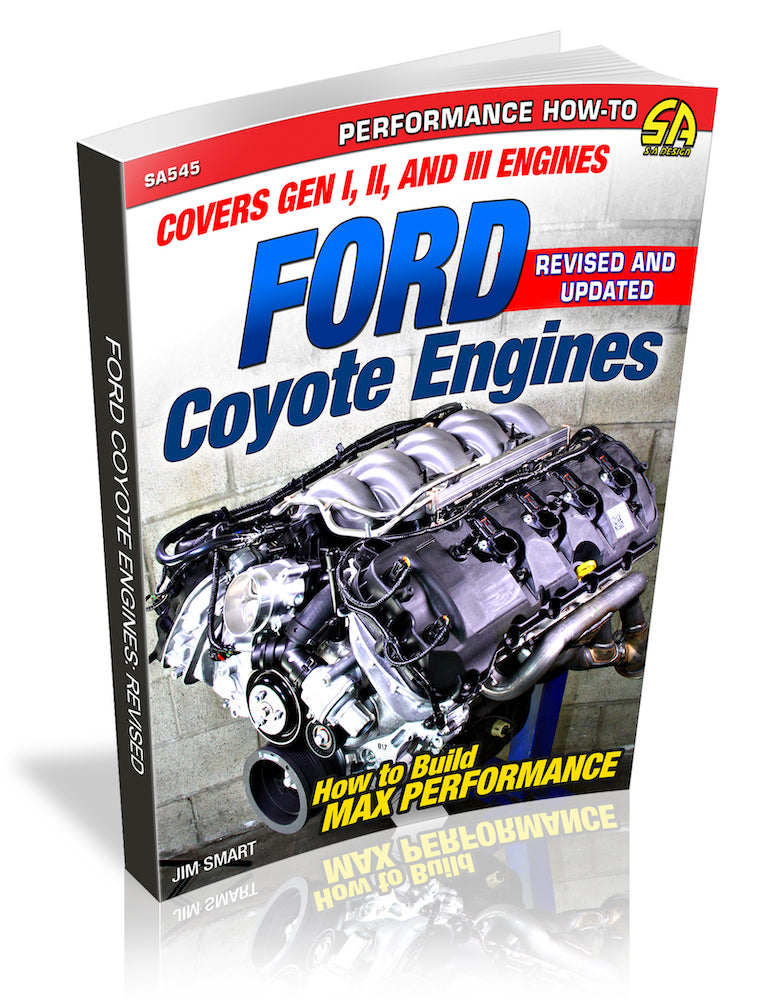Veteran Ford writer and historian Jim Smart highlights all of the latest and greatest options to achieve more horsepower and torque, and of course, faster quarter-mile times in Ford Coyote Engines: How to Build Max Performance-Revised Edition.
In this Revised Edition, now covering Generation III engines as well as Generation I & II, upgrades included are engine building techniques, cold-air induction kits, supercharger and pulley kits, better exhaust headers, fuel system and ECU tuning upgrades, and more. Both Ford and the aftermarket have produced an array of parts to squeeze even more power out of your Coyote.
Ford introduced its first “clean slate design” V-8 engines in the early 1990s in Ford, Lincoln, and Mercury models. Known as the "Modular" engine family, the 4.6L engines employed new overhead cams, multi-valve performance, distributorless ignition, and more. This engine had new technology for its time, and it proved to be an extremely durable workhorse that logged hundreds of thousands of miles in police and taxi applications as well as light-duty trucks. And, of course, hotter versions, and even supercharged versions, found their way into performance applications such as Mustang GTs and Cobras.
By 2011, Ford wanted something hotter and more current, especially for its flagship Mustang GT and GT350 models, which were suddenly competing with new 6.2L LS3 engines in Camaros and 6.4L Hemi engines in Challengers. Enter Ford's new 5.0L “Coyote” engine with Twin Independent Variable Cam Timing (Ti-VCT); it was an evolution of the earlier 4.6L and 5.4L Modular designs. Although the new Coyote engine had increased displacement, it still had far fewer cubes than the competition. Despite less displacement, the Coyote could hold its own against bigger Chevy and Chrysler mills thanks to advanced technology, such as 4V heads with better port and valvetrain geometry. The Coyote is also Ford's first foray into technology that includes Ti-VCT and cam-torque-actuated (CTA) function, which is a fancy way of saying variable cam timing for an incredible power curve over a broader RPM range. Now, in Generation III, Ford has implement a system using both Port and Direct Fuel Injection, taking advantage of the benefits of both systems in a single application.
Even with all of this new technology, there is always room for improvement. If you are looking for even more power from your new Coyote, look no further than this volume.
Acknowledgments
Chapter 1: Introduction to the Coyote Engine
Coyote Block
Bottom End
Cylinder Heads
Cams and Valvetrain
Induction
Exhaust
Lubrication
Cooling System
The 5.2L Voodoo
Gen III Coyote: 2018–2023
Gen III Cylinder Heads and Valvetrain
Dual Fuel Technology
Chapter 2 : Cylinder Block
Block Modifications and Improvements
5.2L Coyote/Voodoo Block
Gen III 2018–2023 Cylinder Block
Chapter 3: Rotating Assembly
Room for Improvement?
Make Mine Flat-Plane
Gen III (2018–2023) Rotating Assembly
Chapter 4: Lubrication
Pump Pointers
Improvements
A Smooth Journey
Gen III (2018–2023) Oiling System
Chapter 5: Cylinder Heads
Boss 302 Head
GT350 Voodoo Cylinder Head
Improving the Coyote Head
TEA CNC-Ported Coyote Heads
JPC Racing Coyote CNC-Ported Heads
Slawko Racing Heads
Gen III Cylinder Heads
Chapter 6: Camshaft and Valvetrain
Improving the Coyote Valvetrain System
Camming Up
Ford Performance Boss Cam
Chains and Guides
Gen III Camshaft and Valvetrain
Chapter 7: Induction
Boss 302
Cobra Jet
Edelbrock Victor II
GT350 5.2L Intake Manifold
Nitrous Oxide = Cheap Power?
Supercharging
Advanced Compressor Stage
Vortech V-3 Si Supercharger
ROUSHcharger
Edelbrock E-Force Boost
Kenne Bell Superchargers
Turbocharging
Gen III Induction Facts
Chapter 8: Ignition and Starting
Ignition System
Sending Unit
Starting System
Charging System
Boss 302 Alternator Conversion
Gen III Electronic Engine Control and Charging
Chapter 9: Exhaust 113 Exhaust Refinement = More Power
A Broader Brush
Ford Performance Racing Parts Power Pack
Corsa 3.0-Inch Cat-Back System
BBK Performance
Chapter 10: Cooling
Cooling Improvements
Coolant Servicing
Gen III Cooling Refinements
Chapter 11: Building the Coyote
Performance Assembly Solutions
L & R Automotive
Chapter 12: Coyote Crate Projects 148
5.0L 4V Coyote Ti-VCT 420-HP Crate M-6007-M50A
5.0L 4V Coyote Ti-VCT 460-HP Crate M-6007-M50C
5.0L Coyote Aluminator Naturally Aspirated M-6007-A50NAA
5.0L Coyote Aluminator Naturally Aspirated M-6007-A50NAB
5.0L Coyote Aluminator SC M-6007-A50SCA
5.0L Coyote Alumniator SC M-6007-A50SCB
5.0L Coyote Aluminator SC M-6007-A50NAB
Ford Performance 5.2L Aluminator XS
Edelbrock E-Force Coyote
Proving the Coyote
Source Guide





